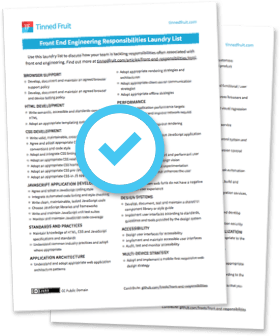Tinned Fruit Missives July 2017
I present a not-particularly-front-end list of links this month. But that’s OK, right? The whole purpose of this newsletter is to help you think about front-end development in the context of product design and strategy, business, the social sciences, software development practice, software architecture and other big topics. That’s my excuse, anyway.
All the best,
– Jim
The Illusion of Speed - Paul Bakaus
https://paulbakaus.com/tutorials/performance/the-illusion-of-speed/
I often feel a bit wary of suggesting objective measures of UI performance. This article explains why. Performance is inherently subjective, context-dependent and therefore open to all sorts of clever tricks that wouldn’t impact objective metrics. Perhaps we should be testing how fast an app feels as part of usability testing, using real-world conditions.
You Are Not Google - Ozan Onay
https://blog.bradfieldcs.com/you-are-not-google-84912cf44afb
Although this article focuses on back-end stuff like databases, BigData and service-oriented architecture, the message applies to modern front-end systems too. Just because something seems to have worked for [Giant Tech Company], doesn’t mean it’s right for your company right now. I see this on the front-end in the form of thoughtless adoption of JavaScript application frameworks, which can lead to over-engineering given the use case at hand. Ozan suggests a sensible six step approach to assess potential technology choices.
Complexity and Strategy - Terry Crowley
https://hackernoon.com/complexity-and-strategy-325cd7f59a92
A long but fascinating insight from the horse’s mouth into how interacting features across multiple platforms compound development complexity, and how big companies like Microsoft (where the author was CVP of Office Development for 10 years) and Google actually use this as a competitive moat.
The latest from Tinned Fruit
Technical Debt Often Isn’t - Jim Newbery
https://tinnedfruit.com/writing/technical-debt-often-isnt.html
Developers talk a lot about technical debt. But what about the product and UX debt that often goes along with it? This month I wrote about how bad debt doesn’t just emerge as the inevitable product of coders coding. It’s closely bound to organisational structure, communication practices and the design and development process.
Some other World Wide Web hyperlinks I have enjoyed this month
- CSS vs. JavaScript: Trust vs. Control - Christian Heilmann
- The World & CSS - Håkon Wium Lie (talk)
- Connect: behind the front-end experience - Benjamin De Cock
- Why Quip doesn’t have platform-specific engineering teams - Alon Levi
- Building Production-Ready CSS Grid Layouts Today - Morten Rand-Hendriksen
- Refactoring Tunnels - Harry Roberts
Tinned Fruit Missives is a monthly newsletter about web product development and front-end practices published by Jim Newbery, an independent consultant from Edinburgh in Scotland.
I help growing web product companies with their front-end development strategy and implementation. Let’s talk!.
